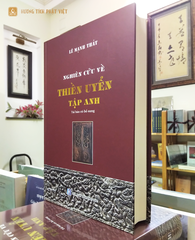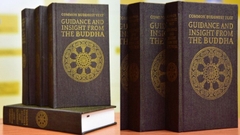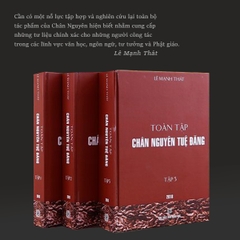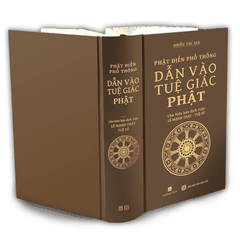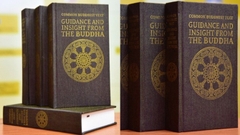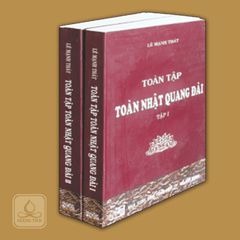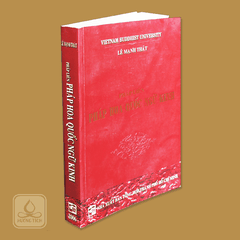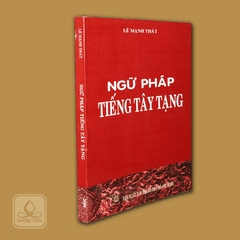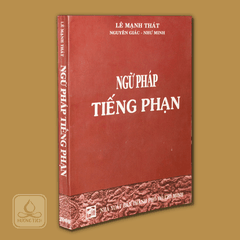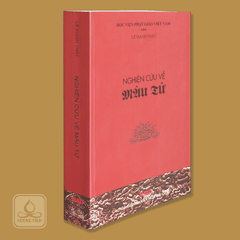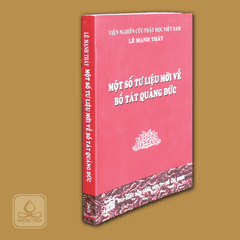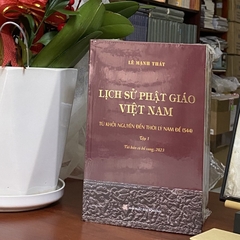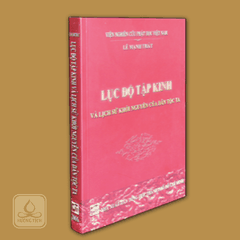-
-
-
Phí vận chuyển: Tính khi thanh toánTổng tiền thanh toán:
-
Trần Nhân Tông - A biographical study
150.000₫
Mô tả :
Đang cập nhật ...
- Tên sách : Trần Nhân Tông A biographical study
- Tác giả : Lê Mạnh Thát
- Dịch giả : Đạo Sinh
- Ngôn ngữ : Anh
- Số trang : 346
- Nhà xuất bản : Tổng Hợp TP. HCM
- Năm xuất bản : 2006
- Phân loại : Sách tiếng Anh-English
- Tóm tắt :
TRẦN NHÂN TÔNG
A BIOGRAPHICAL STUDY
Lê Mạnh Thát
Translated from Vietnamese by Đạo Sinh
NHÀ XUẤT BẢN TỔNG HỢP TP. HỒ CHÍ MINH
PL.2550 - 2006 Vạn Hạnh Monastery
Preface
The Emperor Nhân Tông of the Trần dynasty is a national hero who made great contributions to the history of Vietnam in various aspects. It was under his leadership that the Vietnamese people could reach their zenith of the age. Together with most gifted military strategists he was capable of motivating their potential strength for defeating the most ferocious and veteran Mongolian army of the time in such glorious battles as Hàm Tử, Chương Dương, Bạch Đằng, and Tây Kết. The Emperor also succeeded in extending the country's boundaries, laying a strong foundation for the people's common cause of 'marching southward' - a cause that the Vietnamese will always remember with gratitude.
Furthermore, two greatly significant developments occurred in Vietnamese culture during his reign. The first is the usage of the Vietnamese language together with Chinese as the official scripts of the imperial court. In the earlier dynasties the Vietnamese language must have been used to some extent, yet this fact had not been proven by any documentary evidence until his reign of Nhân Tông. It may be said that the formal usage of Vietnamese during his reign resulted in the appearance of a series of literary works composed in Vietnamese such as the Tiều Ân Quốc Ngữ Thi Tậpby Chu Văn An; a translation of the Shih Chingby Hồ Quí Ly; poems of Nguyễn Biểu and Trần Trùng Quang, a Buddhist monk of the An Quốc Temple; notably, the Quốc Âm Thi Tậpby Nguyễn Trãi; and the earliest Vietnamese translations of Buddhist texts Phật Thuyết Đại Báo Phụ Mẫu Ân Trọngand Phật Thuyết Báo Phụ Mẫu Ân Trọng, which are said to have been carried out by Zen Master Viên Thái are extant today. The second is that the Emperor himself founded a new line of development of the Zen school, namely, the Trúc Lâm Yên Tử, holding that the Way to enlightenment may be cultivated peacefully right in worldly life.
Accordingly, under the reign of Nhân Tông, there occurred many great and inter-related events in political, military and cultural aspects: the double victory over Mongol-Yuan invaders, the annexation of the two districts Ô and Lý to the country's territory, the usage of Vietnamese, together with Chinese, as the official written language; and eventually, new developments in thought.
Thus it was within the context of these events that the Trúc Lâm Zen school came into being with its historical missions of laying the foundation development of Vietnamese Buddhist in the centuries that followed, and setting forth the cause of Vietnamese southward expansion in the same period. It is not quite by chance that the First Patriarch of the Thảo Đường Zen school, i.e., the Emperor Lý Thánh Tông, had begun the same cause in 1069, that the Emperor Nhân Tông went on to lay the foundation for it by establishing the two districts Thuận and Hóa, and that the Bodhisattva-in-Precepts Hưng Long Nguyễn Phúc Chu gave the order for General Nguyễn Hữu Cảnh to build the city of Saigon and develop the South into an integral part of Vietnam nearly 400 years later. Behind all of these achievements by such talented and energetic sons of the Fatherland there must be some philosophical foundation which may be studied in the poem "Cư Trần Lạc Đạo" (Worldly Life with Joy in the Way) by the Emperor Nhân Tông. For, being originally preserved in the monasteries of the Trúc Lâm School, it may be employed for intensive study of its strategic and statecraft implications.
So great was the Emperor's political and military career that it has been extolled and appreciated over seven hundred years by his contemporaries such as Trương Hán Siêu, Trần Minh Tông, Phạm Sư Mạnh and hose in subsequent generations such as Nguyễn Trãi, Ngô Sỹ Liên, Lê Quí Đôn, Ngô Thì Nhiệm, and so on. And his literary works, too, have been gradually collected in the Việt Âm Thi Tập, the Toàn Việt Thi Lục, the Tam Tổ Thực lục, etc. The collections, however, have not been satisfactory so far. All of the diplomatic correspondence submitted to the Yuan court by the Emperor, for instance, has not been completely collected and published. At least among the possible accounts preserved hitherto.
We, therefore, propose so study once more the military and political career and literary works that the Emperor Nhân Tông has left for us. So, the book now in his reader's hands is an embodiment for such an intention. This book consists of ten chapters and generally deals with his political and military career describes the events of his youth up to his roles in the two wars of 1285 and 1288; the extension of the country's territory; the usage of the Vietnamese language; and the foundation of the Trúc Lâm Yên Tử Zen School.
Vạn Hạnh Monastery
The 9th of the 9th month of Lunar Year Kỷ Mão (1999)
Lê Mạnh Thát



